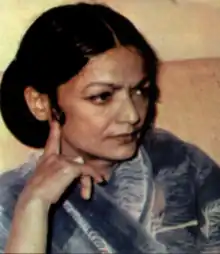Khadija Mastoor خدیجہ مستور | |
|---|---|
 | |
| Born | 11 December 1927 Bareilly, British India |
| Died | 25 July 1982 (aged 54) London, England |
| Nationality | Pakistani |
| Occupation(s) | Writer and novelist |
| Spouse | Malik Zaheer-ud-Deen Babar Awan |
| Children | Kiran Fayyaz Malik Pervez Alam Awan |
Khadija Mastoor (Urdu: خدیجہ مستور, romanized: K͟hadījah Mastūr; 11 December 1927 – 25 July 1982) was a Pakistani short story writer and novelist who worked in Urdu literature.[1] Her novel Aangan is widely considered a literary masterpiece in Urdu literature, which has also been made into a television drama.[2][3] Her younger sister Hajra Masroor was also a short story writer while poet, playwright and newspaper columnist Khalid Ahmad was her younger brother.[4][5][6][7]
Early life
Khadija Mastoor was born on 11 December 1927 in Bareilly, India. She migrated to Lahore with her family after the independence of Pakistan in 1947 and settled there.[1]
Literary career
Mastoor started writing short stories in 1942 and continued writing till her death. Five books of her short stories and two novels have been published.[5] Her stories were based on social and moral values as well as political. Her writing was based on experience and observation.[6]
Literary work
Novels
- آنگن, Aangan (1962)[8]
Winner of the Adamjee Literary Award.[3] In 2010, on publishing Khadija Mastoor's novel Aangan, Chairman of Pakistan Academy of Letters, Fakhar Zaman said that the novel was one of her biggest literary achievements.[2] - زمین, Zameen (1983)[9]
Short stories
Other books
Personal life
She was married to journalist Malik Zaheer-ud-Deen Babar Awan and they had two children Kiran Fayyaz and Malik Pervez Alam Awan.[1]
Death and legacy
Khadija Mastoor died on 25 July 1982 in London, England and was buried in Lahore, Pakistan.[1]
In 2005, an event was arranged at the Karachi Arts Council where the chief guest was her sister Hajra Masroor, a noted writer herself. This event was presided over by another noted scholar Sahar Ansari. Ansari said that both sisters as writers established their own styles and traditions. He also said that Khadija Mastoor simply looked around and wrote down her experiences.[6]
See also
References
- 1 2 3 4 "Khadija Masroor's anniversary observed". Pakistan Observer (newspaper). 27 July 2012. Archived from the original on 7 August 2012. Retrieved 23 June 2019.
- 1 2 Pakistan Academy of Letters (PAL) publishes two books interface.edu.pk website. Retrieved 23 June 2019
- 1 2 NewsBytes (29 March 2017). "Period drama Aangan to make way to small screen soon". The News International (newspaper). Retrieved 23 June 2019.
- ↑ Poet Khalid Ahmad laid to rest Dawn (newspaper), Published 20 March 2013. Retrieved 23 June 2019
- 1 2 "Khadija Mastoor's death anniversary". The Frontier Post (newspaper). 26 July 2012. Archived from the original on 3 February 2013. Retrieved 23 June 2019.
- 1 2 3 4 "Khadija Mastoor's writings praised". Dawn. Pakistan. 3 September 2005. Retrieved 23 June 2019.
- ↑ "Great story writer Khadija Mastoor's anniversary today". Samaa TV News. 26 July 2012. Archived from the original on 6 January 2014. Retrieved 23 June 2019.
- ↑ Asif Farrukhi (25 November 2018). "FICTION: FOUND AGAIN IN TRANSLATION". Pakistan: Dawn. Retrieved 23 June 2019.
- ↑ Zameen. (Book, 1983). OCLC 655050132. Retrieved 27 February 2021.
{{cite book}}:|website=ignored (help) - 1 2 3 4 Khadija Mastoor books on goodreads.com website. Retrieved 23 June 2019
External links